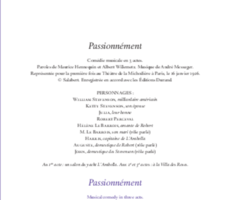Passionnément
Comédie musicale in 3 acts, premièred on 15 January 1926 at the Théâtre de la Michodière in Paris.
In 1925 Messager agreed to set to music Passionnément, a three-act libretto by Maurice Hennequin with lyrics by Albert Willemetz, who instigated the project. At its première on 15 January 1926 at the Théâtre de la Michodière, the work was a triumphant success, and the second-act waltz-song that gave it its title appealed instantly. Here Messager’s irresistible melodic charm is exercised in a study of morals and characters, in which appearances and prejudices are unmasked. The American millionaire William Stevenson, a teetotaller, eventually succumbs to the delights of champagne and is metamorphosed from a swindler into a man of kindness and consideration. He gives up trying to cheat the young Frenchman Robert Perceval and, having discovered that the latter and his own wife Ketty (a former music-hall star) are in love, gives her a divorce to enable them to marry. He himself continues his life’s journey with Ketty’s young Canadian maid, Julia, who has dreams of leading a comfortable bourgeois life. The role of Hélène (Robert’s jealous mistress) further adds to the strong female presence in a plot brim-full of vitality, in which the songs are above all introspective moments: Julia’s mischievousness as she sets forth her conception of existence (“Moi, toute la vie je me la représente”), Robert’s charm and elegance as he picks the petals from the daisy (“Passionnément”), Stevenson’s “Si l'Amérique est le plus grand pays du monde”, showing jazz influence. Henri Malherbe, writing in Le Temps, claimed that Messager “seems to live in an enchanted world, from which sadness and fatigue are banished”; but in Ketty’s “Ah! pourquoi les bons moments passent-ils si vite” and the trio “Dès que l'âge”, the work also expresses nostalgia and regret at the swift passage of time.
Scientific publications
Publication
André Messager. Passionnément
Articles


